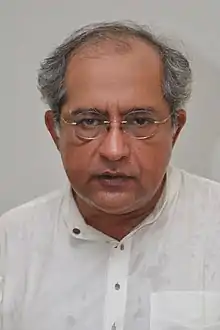Tridip Suhrud
Tridip Suhrud (born 19 December 1965) is an Indian writer, political scientist, cultural historian and translator from Gujarat, India.[1]
Tridip Suhrud | |
|---|---|
 Suhrud in 2016 | |
| Born | 19 December 1965 Anand, Gujarat |
| Occupation | writer, political scientist, cultural historian and translator |
| Language | Gujarati, English |
| Education | M.A, Ph.D |
| Academic background | |
| Thesis | Narrations of a Nation: Explorations Through Intellectual Biographies (1999) |
| Doctoral advisor | Ashis Nandy |
Life
Suhrud was born in 1965 in Anand, Gujarat. He completed a Master of Arts in Economics and Political Science and earned a Ph.D under Ashis Nandy for his thesis Narrations of a Nation: Explorations Through Intellectual Biographies, a socio-historical work on 19th century Gujarati literature in the context of autobiographies written by Narmad, Manilal Dwivedi and Govardhanram Tripathi.[2][3]
He served as a coordinator at the Behavioural Science Centre, St. Xavier's College, Ahmedabad (1989–1992); as a visiting fellow at the Committee for Cultural Choices and Global Futures, CSDS, Delhi (1993–1994); as a faculty member at the National Institute of Design, Ahmedabad (1994–2001); and as a professor at DAIICT, Gandhinagar (2001–2012).[2] After working for five years with Sabarmati Ashram as a director, he resigned in August 2017.[4]
In 2017, he was appointed as professor and director of CEPT Archives.[5]And in 2019 he was appointed as the provost for CEPT University. He is a member of the Gandhi Heritage Sites Mission of the Government of India.[6]
Works
He translated several works from English into Gujarati, including Ashis Nandy's The Intimate Enemy: Loss and Recovery of Self Under Colonialism as Antarang Ari, G. N. Devy's After Amnesia: Tradition and Change in Indian Literary Criticism as Smrutibhranshna Pagle Pagle and Chandulal Bhagubhai Dalal's biography of Harilal Gandhi as Harilal Gandhi: A Life (2007).[1][7]
He translated two major works of Gujarati literature into English; Suresh Joshi's experimental novel Chhinnapatra (as Crumpled letter)[3] and Govardhanram Tripathi's epic novel Saraswatichandra.[8] He also translated the biography of Mahatma Gandhi in four volumes written by Narayan Desai into English from Gujarati.[7]
He translated Mahatma Gandhi's Hind Swaraj into Hindi.[1]
Awards
He received the Katha Award in 1999. He received Sahitya Akademi's Translation Prize in 2009 for his translated work, Harilal Gandhi: A Life.[1][9]
Bibliography
- Chandulal Bhagubhai Dalal; Tridip Suhrud (2007). Harilal Gandhi: a life. Orient Longman. ISBN 978-81-250-3049-2.
- Tridip Suhrud (2009). Writing Life: Three Gujarati Thinkers. Orient Blackswan. ISBN 978-81-250-3043-0.
- Tridip Suhrud (2010). An Autobiography, Or, The Story of My Experiments with Truth: A Table of Concordance. Routledge. ISBN 978-0-415-57142-5.
- Mahatma Gandhi (2014). Beloved Bapu: The Gandhi-Mirabehn Correspondence. Orient Blackswan Private Limited. ISBN 978-81-250-5615-7.
- Kinnari Bhatt; Tridip Suhrud; Malvika Singh (2016). Apostle of the Twentieth Century--M. K. Gandhi: Curated by Kinnari Bhatt and Tridip Suhrud. Academic Foundation. ISBN 978-93-327-0203-5.
- Suresh Hariprasad Joshi; Tridip Suhrud (1998). Crumpled letter. Macmillan India.
References
- "Bapu scholar feted by Sahitya Akademi". dna. 16 February 2010. Retrieved 15 July 2018.
- "Curriculum Vitae (of Tridip Suhrud)" (PDF). Gujarat Vidyapith. Retrieved 15 July 2018.
- "Our Contributors". Indian Literature. 42 (5): 224. September–October 1998. JSTOR 23338795.
- "Sabarmati Ashram director Tridip Suhrud resigns". The Indian Express. 30 August 2017. Retrieved 16 July 2018.
- "Dr Tridip Suhrud joins as Director of CEPT Archives – News". CEPT. 8 July 2018. Retrieved 15 July 2018.
- "Dr. Tridip Suhrud – Member – Governing Council". MICA-The School of Ideas, Strategic Marketing and Communication program in India. Retrieved 16 July 2018.
- Shail Mayaram (2013). Philosophy as Samvada and Svaraj: Dialogical Meditations on Daya Krishna and Ramchandra Gandhi. SAGE Publications. p. 295. ISBN 978-81-321-1870-1.
- Shah, Rajiv (8 October 2015). "'I translated "Saraswatichandra" because we have not done it for 128 years"". Scroll.in. Retrieved 16 July 2018.
- "SAHITYA : Akademi Awards". Sahitya Akademi. Retrieved 15 July 2018.